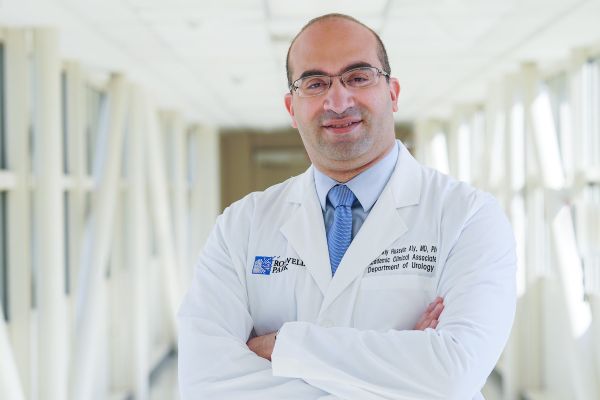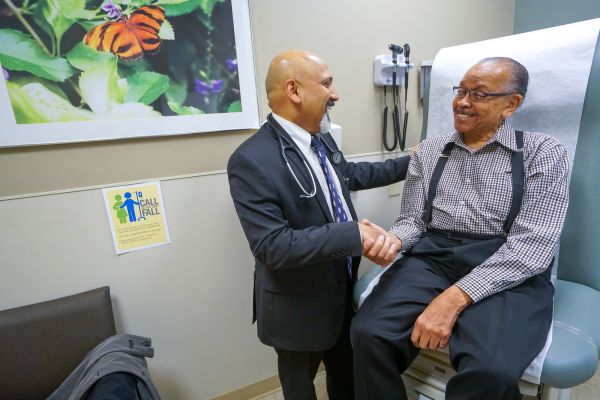Prostate cancer treatments can have side effects that may result in changes that affect intimacy, desire and function. While these symptoms are often temporary, they can be distressing and it’s important to talk to your physician about what to expect and the steps you can take to improve them.
Why this happens
As men become sexually aroused, the brain sends messages through the nervous system to the muscular walls of the blood vessels in the penis. The vessels enlarge, allowing more blood to flow into the penis. The incoming blood makes the penis bigger and harder, causing an erection.
Even if your libido is normal, your hormones, nervous system, muscles and blood vessels need to work properly to get an erection. Cancer treatments may affect your hormones, which in turn can affect your libido as well as the nerves, muscles or blood vessels that play important roles in causing an erection.
Prostate cancer treatment and erectile dysfunction
Erectile dysfunction (ED) is one of the most common side effects of prostate cancer treatment. Nearly all men will have trouble getting an erection for a period of time after undergoing different types of treatment, such as:
- Surgery. The nerves responsible for an erection (the cavernous nerves) travel very close to the prostate gland and may be injured during the removal of the prostate. Nearly all men who have their prostate removed will have trouble getting an erection for some time, even if they have a "nerve-sparing" operation. However, most men recover with time.
- Radiation therapy. Damage to the delicate tissues involved in getting an erection, such as nerves, blood vessels or blood flow, can occur with radiation therapy. These side effects appear more slowly during the year after treatment. Men may have softer erections, lose their erection before climax (orgasm) or not be able to get an erection at all.
- Chemotherapy. The drugs used in chemotherapy treatment of prostate cancer may affect your libido and erections if it affects testosterone production, but most men still have normal erections. Chemotherapy can also cause fatigue or distress, which can affect your sexual desire and ability to have an erection, but normal desire usually returns when treatment ends.
- Hormone therapy. The prostate depends on androgens, such as testosterone, to do its work. Unfortunately, testosterone may help some prostate cancers to grow. The hormone treatment used in prostate cancer, called androgen deprivation therapy (ADT) blocks androgens to slow the growth of prostate cancer, but it can also decrease libido and sexual function. (ADT does not cure prostate cancer.)
Recovery after prostate cancer treatment
Time is the most important factor in recovery. The healing process for men who have had nerve-sparing radical prostatectomy (removal of the prostate) is often 18 to 24 months or more, because nerve tissue requires a longer time to heal. How much erectile function returns depends on several things:
- The type of operation you had (one, both, or no nerves spared). Most men with intact nerves will see a substantial improvement within a year of treatment.
- Your age: Men under 50 or 60 are more likely to recover their erections than older men.
- Your erectile function before the operation. Men who had good erections before surgery are more likely to recover their ability to get an erection than those who had previous erection problems.
It is also common to need medications to assist with erectile function, even if you did not need them before your operation.
Rehabilitation and aids
Studies suggest that starting a program to promote erections about six weeks after surgery can help some men recover sexual function. Different methods are available, depending on your case, your level of motivation and the judgment of your surgeon. These penile rehabilitation programs focus on increasing blood flow to the area to encourage healing and help men have regular erections that are hard enough for penetration. Having two to three erections a week, even if there is no sexual activity, helps keep the tissues in the penis healthy.
Several options are available to treat ED, and they may or may not be part of a rehabilitation program:
- Medication: sildenafil/Viagra®, tadalafil/Cialis® or vardenafil/Levitra MUSE™ (a prostaglandin suppository that you insert into your urethra)
- Vacuum erection devices
- Penile implant
- Penile self-injection with a prostaglandin: alprostadil/Caverjet™/Edex™
Get more information
If you are interested in learning more or discussing your options, please visit our Sexual Health Clinic.
Learn More


